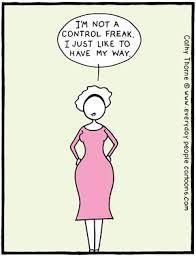The Devil Made Me Do It and Other Lies
 My blog this week is a guest post by Dr. Flora Brown, who taught critical thinking for 20 years at Fullerton College in California. Dr. Brown muses on the illusion of control in our lives.
My blog this week is a guest post by Dr. Flora Brown, who taught critical thinking for 20 years at Fullerton College in California. Dr. Brown muses on the illusion of control in our lives.
The 1970s American comedian Flip Wilson became famous for his portrayal of sassy Geraldine, who excused her behavior by saying “The Devil made me do it.” This trademark quip became a national catch phrase.
It’s human nature to place blame outside ourselves for our behavior. But it is equally unproductive to believe we have control in situations where we do not.
Each morning when I join my neighbor for a walk, I dutifully push the button and wait until the crosswalk man symbol appears, signaling that it’s safe for me to cross. Since modern signal lights are computerized, I have no control over activating that light. It just makes me feel better believing I do.
There’s a similar phenomenon in gambling. When modern casinos computerized slot machines, a decision was made to leave the handles for gamblers to pull for each play. Appropriately nicknamed “one-arm bandits”, these handles give gamblers something to do that reinforces the illusion they have control in a situation where they have none.
Benefits of the Illusion of Control
Believing we have control in situations where we have little or none can be empowering.
When I applied for a community college teaching position, it was to be the second full-time African American teacher in the history of a school approaching its 85th anniversary. While I had strong educational preparation and experience, the decision would be made by a committee of strangers who evaluated my application along with 100 similarly qualified teachers. My fate depended on many considerations other than just my personal qualifications.
If I had thought about how little control I had over the decision of that committee, I might never have applied. But I didn’t think about that. I applied for the position and prepared well for the interview. If I hadn’t applied, I definitely wouldn’t have gotten the job where I enjoyed a 20-year career.
Sometimes, the illusion of control encourages us to take responsibility for our actions.
Do We Ever have Control?
When, if ever do we have control?
We all laugh at Geraldine when she says “the Devil made me do it” because we immediately recognize it as a handy excuse for her excessive shopping. But most of us have difficulty recognizing how we smudge the line between what we control and what we don’t.
In reality, our thoughts and actions are the only things that belong to us. We never have control over what another person does or says, or the circumstance we encounter. We just have control over what we think about and how we react to what we experience. Our attitude will not change the situation or outcome, but it will increase our chances of survival and triumph.
In his powerful book, Man’s Search for Meaning, Viktor Frankl, one of the world’s best-known Holocaust survivors, tells of the day he began to see beyond the reality of the daily horror he endured in the camps.
We who lived in concentration camps can remember the men who walked through the huts comforting others, giving away their last piece of bread. They may have been few in number, but they offer sufficient proof that everything can be taken from a man but one thing: the last of the human freedoms—to choose one’s attitude in any given set of circumstances, to choose one’s own way.
After suffering in four concentration camps for three years, Frankl was released, but his wife, parents, and family had all died in the camps. Frankl went on to become a psychotherapist and developed a treatment called logotherapy, which theorizes that our primary motivation is our search for meaning in life. He believed that if we can find personal meaning in life, we can overcome dismal circumstances.
Frankl’s experiences in the concentration camps did not make him vengeful, insensitive, or uncaring toward others’ sufferings. Instead, he realized that the guards could take everything from him, including his life, but they couldn’t control his mind or spirit. They couldn’t stop his sense of the search for meaning in life.
Frankl discovered it is our inner control that gives us power in our lives. It is discovering meaning—in a world that is out of control—that gives us peace.
The Shift in Control
It can be exhilarating to feel in control, to be able to direct our lives like a ringmaster. Some people fight to hold onto perceived control, and others cheat for it, lie for it, and even kill for it. Even so, the reality is that no amount of victory, good fortune, physical fitness, prayer, personal achievement, fame, yoga, or meditation will spare us from eventually finding ourselves in situations over which we have no control.
Since we know these situations will recur, how great it would be to greet them like a friend, no longer trying to control them, but learning from them and letting them pass. On that day, we’ll be equally at ease with taking responsibility for our behavior and relaxing when we are not in charge.
 Flora Morris Brown, Director of Content for www.ColorYourLifePublished.com, helps take the fear out of publishing, whether it’s your 1st or 7th book. Her 4-week on-demand e-course Rockin’ My Book, helps executives, coaches and entrepreneurs to increase credibility by writing a book. She is the author of Color Your Life Happy: Create the Success, Abundance, and Inner Joy You Deserve, among other books.
Flora Morris Brown, Director of Content for www.ColorYourLifePublished.com, helps take the fear out of publishing, whether it’s your 1st or 7th book. Her 4-week on-demand e-course Rockin’ My Book, helps executives, coaches and entrepreneurs to increase credibility by writing a book. She is the author of Color Your Life Happy: Create the Success, Abundance, and Inner Joy You Deserve, among other books.
Flora Morris Brown, Ph.D.
www.coloryourlifepublished.com
Dr. Brown’s comment continue the discussion on the broad range of issues that confront my protagonist, Lindsey Chandler, in my novel, A Fitting Place. If you would like to contribute to the discussion, please check the topics and guidelines here.
The post The Devil Made Me Do It and Other Lies appeared first on Mary Gottschalk - Author.



